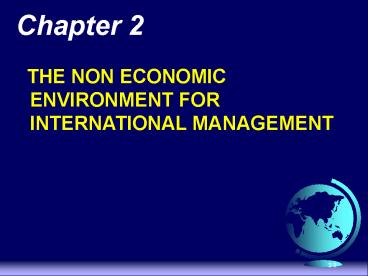THE NON ECONOMIC ENVIRONMENT FOR INTERNATIONAL MANAGEMENT PowerPoint PPT Presentation
1 / 14
Title: THE NON ECONOMIC ENVIRONMENT FOR INTERNATIONAL MANAGEMENT
1
Chapter 2 THE NON ECONOMIC ENVIRONMENT FOR
INTERNATIONAL MANAGEMENT
2
Political Environment
- CHINA
- Complex and risky
- Many of Class of 77 graduates are coming into
influential positions. - steps to open up the economy
- privatizing state enterprises
- expanding the size of capital markets
- Accelerating worker retraining
- creating new social services
- Reducing tariffs
3
Political Environment
- EUROPE
- Political situation continues to change making it
difficult to firmly establish a foothold of power - No longer a series of fragmented countries, but a
giant, interwoven region - International management must be aware of
political happenings throughout the entire
continent
4
Political Environment
- Russia
- many MNCs are reluctant to do business there
- Companies refuse to pay taxes
- Price of oil has declined sharply
- barter has become a way of life
- High unemployment
5
Political Environment
- Central and Eastern Europe
- These nations are making the transition to a
market economy - Since the days of communism, most moved first to
the political right, then the left, and now back
to the right
6
Legal and Regulatory Environment
- Islamic Law
- Derived from interpretation of the Quran and the
teachings of the Prophet Mohammed - Socialist Law
- Marxist socialist system - continues to influence
regulations in former communist countries - Common Law
- English law - the foundation of legislation in
the United States, Canada, England, Australia,
New Zealand, and others - Civil or Code Law
- Derived from Roman law and is found in the
non-Islamic and non-socialist countries
7
Basic Principles of International Law
- Principle of sovereignty
- International jurisdiction
- Nationality principle
- Territoriality principle
- Protective principle
- Doctrine of comity
- Act of State doctrine
- All acts of other governments are considered to
be valid by local courts - Treatment and rights of Aliens
8
Examples of Legal and Regulatory Issues
- Foreign Corrupt Practices Act - made it Illegal
to influence foreign officials through personal
payment or political contributions - Bureaucratization - Regulations to reduce the
ability of foreigners to do business locally - Privatization - Government deregulation and
free market
9
2000 Corruption Perception Index (AWSJ Mar. 12,
2001)
- Rank Country CPI Score
- 1 Finland
10.0 - 2 Denmark
9.8 - 3 New Zealand, Sweden 9.4
- 5 Canada
9.2 - 6 Iceland, Norway, Singapore 9.1
- 9 Netherlands
8.9 - 15 Hong Kong 7.7
- 23 Japan
6.4 - 28 Taiwan
5.5 - 63 China
3.1 - 69 India, Philippines 2.8
- 76 Vietnam
2.5 - 85 Indonesia
1.7
10
Technological Environment
- Internet Access allows people to obtain
information from millions of sources - Satellites will make it possible for everyone to
send and receive voice, data, and digitized
images through hand-held telephones - Automatic translation telephones will allow
people to communicate in their own language to
anyone in the world who has access to a telephone
11
E-Commerce
- ADVANTAGES
- Tap into funds from Internet -- no need for ATM
Machines - Companies receive immediate payment, reducing bad
debts while increasing working capital - DISADVANTAGES
- Some system must be in place for
- Payment conversion
12
Telecommunications
- As a result of the wireless telephone service,
growth in this technology has been rapid - future growth
- Many countries believe that without an efficient
telephone system, their economic growth will
stagnate - Governments are accepting the fact that
attracting foreign investment and know-how in
telecommunications means giving up control to
private industry
13
The Employment Fallout from Technology
- how will technology affect the nature and number
of employees? - technology has the potential to largely displace
employees in all industries - Emerging information technology also makes work
more portable
14
Favorite Places Identified by Japanese Companies
- 1. China
- 2. United States
- 3. Thailand
- 4. Indonesia
- 5. Malaysia
- 6. Taiwan
- 7. India
- 8. Vietnam
- 9. South Korea
- 10. The Philippines
- (AWSJ Mar. 12,
2001)

